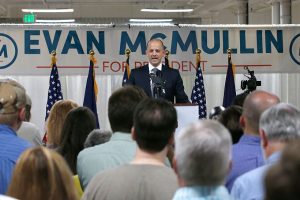In the general caterwauling about rising Islamophobia in the United States, here is a key fact: Millions of Americans of the Mormon faith are standing shoulder to shoulder with Muslims out of a deep and visceral distaste for religious persecution.
This is most noticeable in Utah, where Mormons make up half the electorate and the community is mobilising solidly against Republican Party presidential nominee Donald Trump.
In denying Trump a state that would normally be in the Republican column, Mormons would deliver a wounding kick in a particularly sensitive part of the party’s anatomy. Namely, its self-belief and confidence in its stranglehold on politics in Utah. As Quin Monson, a political science professor at Brigham Young University, a Mormon-affiliated institution, recently put it: “Any Republican with a pulse should be able to get into the 60% range (in Utah).” Trump’s falling support, he said, is “a meltdown of epic proportions”.
“Epic” is a big word but the change Utah is contemplating would make history. If it squeamishly eschews Trump as well as his Democratic Party rival Hillary Clinton, it will probably vote for an independent, such as Evan McMullin, he of the balding pate and boyish face, is one of the Mormons’ own.
In recent days, polls have indicated that McMullin, a former CIA officer, has a good chance of carrying the state. If he does, McMullin would become the first third-party candidate since George Wallace in 1968 to win electoral college votes. And it would be Utah that will have helped McMullin make it into the history books.
This state of affairs has arisen because the Mormons are fiercely protective of religious freedom. They are deeply unsettled by Trump’s anti-Muslim and anti-refugee opinions because they know what it is to be a religious minority. The Mormon Church of Jesus Christ of Latter-Day Saints said as much at the beginning of the year.
The timing was as significant as what the church said. It issued a statement soon after Trump made his first extraordinary call for a ban on the entry of Muslims into the United States. It explicitly linked religious liberty as pertaining to Mormons with that afforded to Muslims.
How and why? There is a reason the Mormons feel for American Muslims and the sense of insecurity they currently face. As a faith group, the Mormons started in New York state in 1830. They constantly moved westward as they ran into trouble in different places. Their founder, Joseph Smith, was killed in Illinois in 1844. Once the Mormons settled in Utah, they had to fight hard to stay and put down roots.
Small wonder that Trump’s threats against Muslims have reawakened fears in Mormon hearts. Even in the 21st century, Mormon families tell stories of the life-and-death issues that confronted their ancestors in the 19th, said Monson. In his own family, the lore revolves around his forbears’ terrible passage to Utah, fighting off violent mobs along the way.
Unsurprisingly then, Utah is the only state with a Republican governor to affirm that it welcomes Syrian refugees. Muslims in the state repeatedly say it is one of the best places in the United States to be a member of a religious minority. The imam of the largest mosque in Utah’s capital Salt Lake City is on record lavishing praise on the religious majority among whom he lives.
In its statement on Trump’s remarks, the Mormon Church underscored that it was not about parties and politics. It did not say so explicitly, but the subtext was clear — this was about principles.
This is remarkable considering the number of Americans — 61% of respondents in a new poll — who said they do not require personal morality from a politician. In 2011, less than half of Americans polled said the same.
Among evangelicals, supposedly the most morally conservative community in the United States, 72% of those asked explained away a newly lax pragmatism about personal morality that would allow them to vote for Trump. Just 30% of evangelicals were reported to be so accommodating in 2011.
Some say the Mormons are simply trying to be true to their faith, which warns against leaders who lack principle. The Book of Mormon, their sacred text, describes a society in the New World that perished because its people became overly selfish.
If so, they may also be holding up an article of American faith by reminding the country of the centrality of religious liberty to its belief system.


